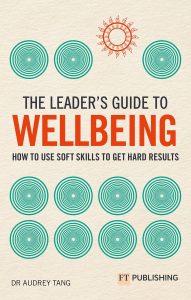By Dr Audrey Tang, below, a chartered psychologist, mental health broadcaster and author of The Leader’s Guide to Wellbeing
 Productivity (and profit) depends on performance, and performance can be greatly enhanced when the leader has a high level of emotional intelligence. This enables them to better understand and manage, motivate, appreciate, support, signpost, direct, train, coach, mentor or role model consistently to their teams. But, for leaders, when you have to navigate the challenges of life’s roller coaster not just for yourself, but your organisation, and with your teams and customers or clients – it can become exhausting. Unfortunately, a misplaced outburst, however unintentional, can do damage that can be difficult to recover from.
Productivity (and profit) depends on performance, and performance can be greatly enhanced when the leader has a high level of emotional intelligence. This enables them to better understand and manage, motivate, appreciate, support, signpost, direct, train, coach, mentor or role model consistently to their teams. But, for leaders, when you have to navigate the challenges of life’s roller coaster not just for yourself, but your organisation, and with your teams and customers or clients – it can become exhausting. Unfortunately, a misplaced outburst, however unintentional, can do damage that can be difficult to recover from.
Practically, Emotional Intelligence may be defined as:
- Ability to recognise emotions responding appropriately in our personal conduct as well as interactions with others
- Ability to express and manage our feelings in an effective manner
- Ability to handle interactive relationships effectively – even if we need to express something different to how we feel inside (and ways to recharge from that demand)
And, like any skill, emotional intelligence can be enhanced with practice.
There are three times where it is best applied or practised:
i) At the point of crisis
There is no point telling yourself in the midst of a cortisol rush to ‘calm down’…instead try to engage your cognitive brain:
Ask yourself “Is there another way I can interpret this?” or “Is there another thing they may have meant”: By being aware that communications are only ever as effective as how they are received, we remain mindful that we might be projecting our own feelings onto a situation, rather than understanding it as it really is. This can stop us taking things too personally, and gives us self awareness which we can then choose to change next time (or not!)
Active Listening: Rather than listening in order to reply (ie. thinking about what you are going to say), or to defend or argue, engage with what you hear; ask questions about what they have said or paraphrase back your understanding to them which enables you to check that you have understood their meaning. When someone feels heard, it builds connection and can go a long way to diffusing a situation.
ii) For resolution: Focus on fact over emotion
Unfortunately while something may not be your fault, it might have ended up your problem to deal with.
Focus on facts and evidence for resolution rather than ‘he said/she said/they said’:
- State the situation as factually as possible (using evidence as appropriate)
- Set out or ask for the resolution being hoped for, and listen to see if negotiation is needed, knowing which procedures are open to you
- If resolution is beyond your limits, bring in someone who can help (just remember to explain the situation to them, so as not to cause further problems in having a disgruntled person repeat themselves!)
- Outline the next steps – giving those involved that sense of control can help restore emotional balance.
iii) Emotional work outside the points of crisis
Because our brains are ultimately designed to survive, we tend to seek, process and experience more negativity than positivity. However, the more we can experience positive situations, the better our positive affect, so:
Spend time with those who make you feel loved. You may ask the question – am I smiling because others make me happy, or is it because I don’t want them to be sad…but either way, at least you are smiling. Longitudinal studies on happiness and work in the field of Positive Psychology cite healthy relationships as a key determinant of life satisfaction and longer life.
Engage in Adventure and curiosity – part of being alert for threat is alertness to difference – but difference is often felt more positively, and so going a different route home, or looking at something from a different angle…simply looking up when you’re out for a walk can also give our emotional brain a boost.
The workplace has the potential to provide a number of health benefits including greater efficiency (Russell, 2003), more effective interpersonal interactions and taking of opportunities (Staw & Barsade,1993), greater motivation (Isen & Baron, 1991), and even greater cognitive flexibility (resulting in better problem solving and creativity) (Clore et al,1994). However, this virtuous cycle can easily become a vicious one when people feel ignored, underappreciated, misunderstood or any number of negative emotions resulting in problems with recruitment, retention and impacting overall sustainability.
As Aristotle said: “Anyone can become angry – that is easy…to be angry with the right person to the right degree, at the right time, for the right purpose and in the right way – that is not easy.” … but we can learn.
 Audrey Tang is a chartered psychologist, mental health broadcaster and author of The Leader’s Guide to Wellbeing
Audrey Tang is a chartered psychologist, mental health broadcaster and author of The Leader’s Guide to Wellbeing


